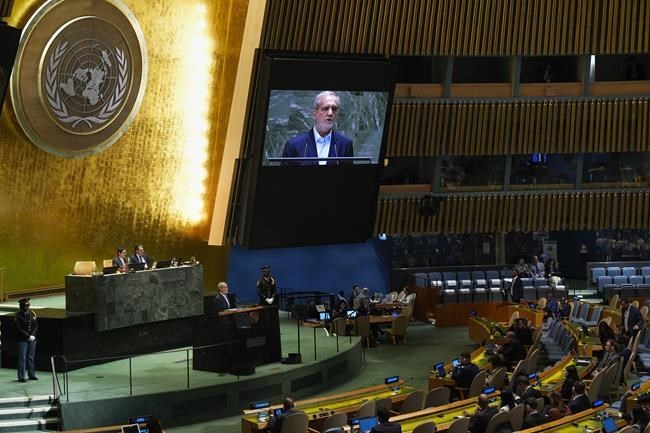
Masoud Pezeshkian, President of Iran, addresses the 79th session of the United Nations General Assembly at United Nations headquarters, Tuesday, Sept. 24, 2024. (AP Photo/Seth Wenig)
Republished September 24, 2024 - 4:44 PM
Original Publication Date September 24, 2024 - 4:06 PM
UNITED NATIONS (AP) — Iran’s new president signaled to world leaders Tuesday that he wants to open a “constructive” chapter in his country’s international relations — but he made clear that everyone else, including the United States, needs to do their part.
In his first speech at the U.N. General Assembly’s annual gathering of world leaders, Masoud Pezeshkian struck a somewhat more measured tone than his predecessors often have in recent years.
“I aim to lay a strong foundation for my country’s entry into a new era, positioning it to play an effective and constructive role in the evolving global order,” said Pezeshkian, a heart surgeon who ran as a reformer. He took office in July.
Iran’s supreme leader, Ayatollah Ali Khamenei, opened the door last month to renewed negotiations with the United States over his country’s rapidly advancing nuclear program, telling Iran’s civilian government there was “no harm” in engaging with its “enemy.” The United States, under former President Donald Trump, withdrew in 2018 from Iran’s deal with several Western nations to curtail its nuclear program in exchange for getting sanctions lifted.
It remains unclear just how much room Pezeshkian will have to maneuver, particularly as tensions remain high in the wider Middle East over the Israel-Hamas war and as the U.S. prepares for a presidential election in November.
Pezeshkian, like Iranian presidents before him, had sharp words Tuesday for Israel. He accused the nation of “atrocities,” “colonialism,” “crimes against humanity” and “desperate barbarism” as it fights Hamas in Gaza and exchanges fire with Hezbollah in Lebanon. Iran backs both militant groups.
Israel’s heavy bombardment of Lebanon in recent days “cannot go unanswered,” he said. He added that consequences would be borne by governments he described as thwarting efforts to end the “catastrophe” in the Middle East while calling themselves champions of human rights, an apparent reference to the United States and allied Western powers.
Washington has been attempting, with Egypt and Qatar, to get Israel and Hamas to agree to a cease-fire deal. But it has been elusive, and now the developments in Lebanon stand to complicate the efforts further.
Directly addressing the American people, Pezeshkian listed a number of Iranian grievances — from sanctions to the 2020 killing of Iranian Gen. Qassem Soleimani in a Trump-era U.S. drone strike — and then urged “all states pursuing a counterproductive strategy towards Iran” to “learn from history.”
“We have the opportunity to transcend these limitations and enter into a new era. This era will commence with the acknowledgement of Iran’s security concerns and cooperation on mutual challenges,” he said, appealing anew for sanctions relief.
“I hope that this message from Iran is carefully heard today,” the new president concluded.
There was no immediate response from the U.S. or Israel.
___
Associated Press writer Edith M. Lederer contributed. See more of AP’s coverage of the U.N. General Assembly at https://apnews.com/hub/united-nations
News from © The Associated Press, 2024